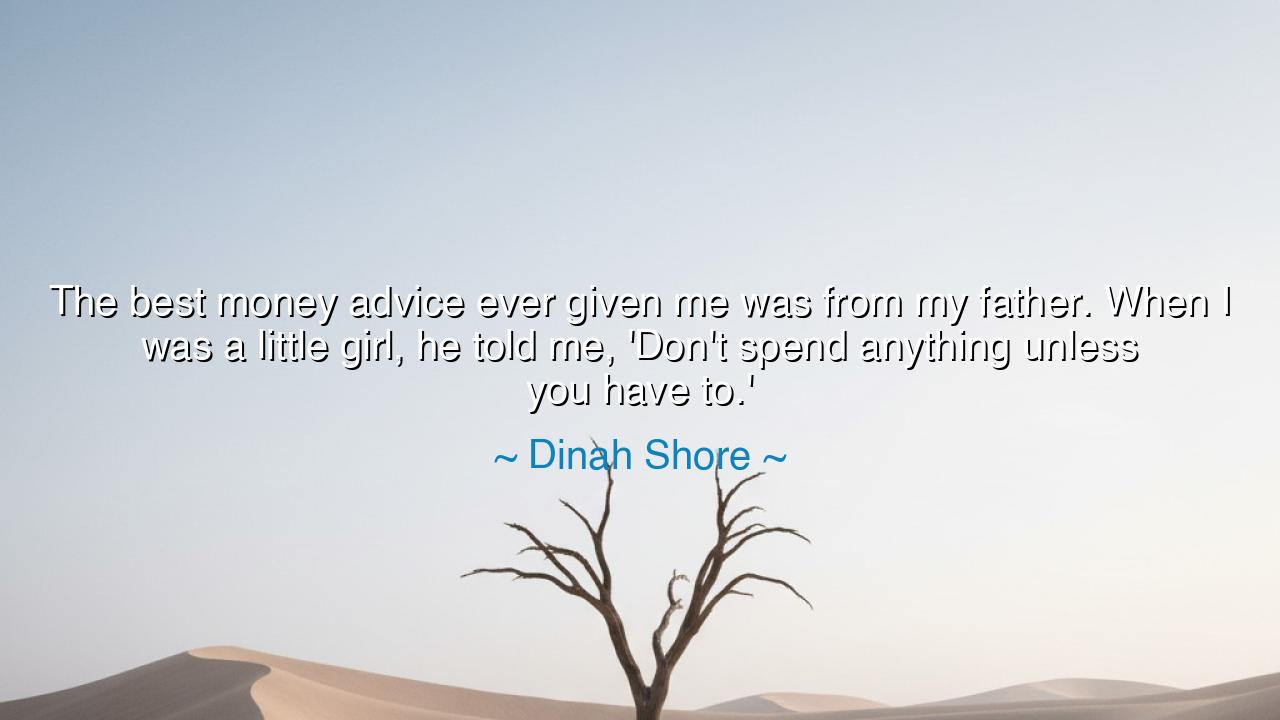
The best money advice ever given me was from my father. When I
The best money advice ever given me was from my father. When I was a little girl, he told me, 'Don't spend anything unless you have to.'






The words of Dinah Shore—“The best money advice ever given me was from my father. When I was a little girl, he told me, ‘Don’t spend anything unless you have to.’”—may sound modest and practical, yet within them lies a wisdom as old as civilization itself. It is a simple command, but one born from generations who knew the cost of every coin, who understood that discipline and restraint are the twin guardians of prosperity. Beneath its plain surface flows a deep river of truth: that wealth is not measured by what we possess, but by what we can preserve.
In the ancient way, this counsel would have been spoken by a sage to his pupil, or a father to his heir, as a principle not only of finance, but of life itself. To “spend nothing unless you have to” is to live with intention—to measure desire against necessity, and to master the restless impulse of want. The ancients taught that every act of spending is an act of judgment, revealing the character of the soul as much as the condition of the purse. The one who spends carelessly becomes a servant to appetite, but the one who spends wisely becomes master of himself. Thus, Shore’s father did not teach her merely how to save money; he taught her how to rule her own heart.
Dinah Shore, a woman of grace, music, and fame, spoke these words not from want, but from memory—remembering a father who had lived through hardship and knew that wealth, like time, is fragile. Her father’s lesson was not born in abundance, but in experience. To him, money was not a toy but a tool, a means of building stability and dignity in a world that could easily take both away. His advice was a shield against the vanity of extravagance and the sorrow of debt. In his simple phrase, he passed to his daughter the wisdom of survival and the virtue of prudence, a quality rarer than gold.
The ancients, too, praised this virtue. Solon of Athens, one of the seven wise men, taught that “wealth shames no man who knows how to use it rightly.” He knew that the path to ruin was not poverty, but excess—that the hunger for more, once awakened, can devour peace itself. In times of plenty, he urged moderation; in times of scarcity, foresight. The farmer who saves grain in good seasons does not fear the famine; the merchant who keeps reserves endures the storm. And so it is with life: the one who guards his resources, his time, and his energy lives in freedom, while the one who spends recklessly becomes the slave of his own desires.
Consider the story of Benjamin Franklin, whose name became a synonym for thrift and wisdom. Born with little, he rose to great heights not through inheritance, but through the steady practice of restraint. “Beware of little expenses,” he wrote, “a small leak will sink a great ship.” Like Shore’s father, Franklin saw that every unnecessary indulgence was a thief that crept into the home disguised as comfort. His genius lay not merely in earning, but in conserving, in seeing money not as a master but as a servant to purpose. Both he and Shore’s father understood a law that time cannot erase: true wealth lies in self-control.
Yet this teaching reaches beyond coins and currency. It is a lesson about contentment—about knowing when enough is enough. The one who learns to say no to needless desires gains a treasure that no market can offer: peace of mind. In a world that tempts us with endless consumption, to live simply is to live wisely. The father’s advice to his daughter, then, was not a restriction, but a liberation—a way of freeing the heart from the tyranny of wanting. For what the wise man spends carefully, he enjoys deeply; and what he saves, he preserves not only for himself, but for those who follow him.
So, dear listener, take this counsel into your own life: spend nothing unless you must, not only in money, but in energy, in time, in emotion. Let every choice be guided by purpose, not impulse. Ask yourself before every act: “Is this necessary? Does it serve my peace?” In practicing restraint, you will discover abundance—not of possessions, but of freedom. You will find that the less you waste, the more you possess; the less you desire, the richer you become.
Thus, the wisdom of Dinah Shore’s father endures like an ancient proverb: that the measure of wealth is not in what we gather, but in what we keep unspoiled by waste. To live with discipline is to walk in dignity; to spend with care is to honor both the labor that earned the coin and the future that depends upon it. Let this teaching be your compass: guard your treasure, rule your desires, and live not in the shadow of want, but in the light of wisdom, where simplicity is strength and restraint is the truest form of wealth.






AAdministratorAdministrator
Welcome, honored guests. Please leave a comment, we will respond soon